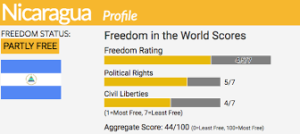Faced with a political crisis and a falling economy, Nicaragua’s President Daniel Ortega is preparing a package of laws that could jail publishers of “fake news” and force foreign-funded groups to register with authorities, which would serve to neutralize possible protests ahead of an election year in which he seeks re-election, AFP reports.
Ortega wants to go to the elections in a situation where the opposition “finds itself with a noose around its neck” and is willing to negotiate on his terms, said sociologist and journalist Oscar René Vargas, a former sympathizer and now a staunch critic of the government.
“Instead of guaranteeing fair elections in 2021, Ortega accelerates toward totalitarianism,” tweeted Carlos Trujillo, the US ambassador to the Organization of American States, The Financial Times reports:
A CID-Gallup opinion poll, published in La Prensa newspaper on Friday found two-thirds of respondents believed Mr Ortega was taking Nicaragua down the wrong path and put support for the 74-year-old leader at 35 per cent, down from 40 per cent in January. Mr Saénz said Mr Ortega’s efforts appeared designed to replicate President Nicolás Maduro’s tactics in Venezuela and attempt to split the opposition.
 Aimel Ríos of the National Endowment for Democracy (NED) urged tougher international pressure. “It does seem that is the only language the regime will understand,” he told a webinar (above) organised by the US Department of State’s Bureau of Democracy, Human Rights and Labor.
Aimel Ríos of the National Endowment for Democracy (NED) urged tougher international pressure. “It does seem that is the only language the regime will understand,” he told a webinar (above) organised by the US Department of State’s Bureau of Democracy, Human Rights and Labor.
“So far only certain individuals and institutions have been sanctioned,” Michael Kozak, acting US assistant secretary of state for the western hemisphere, told the same event. “But that does not mean others are immune.” RTWT
Kovak tweeted that the law was “a dangerous affront to democracy in Nicaragua.”
A Nicaraguan political analyst, José Luis Rocha, said Ortega might have introduced the legislation at this moment to send a message to Washington, the Post adds. “He’s convinced that more sanctions are coming,” Rocha said. “And he’s cracking down at a time when everyone is focused on the elections in the United States.”
 Ortega’s latest moves appear to provide evidence of “authoritarian export” and “authoritarian learning,” defined as processes in which “authoritarian regimes adopt survival strategies based upon the prior successes and failures of other governments,” adds AEI research Fellow Ryan C. Berg. Vladimir Putin and Daniel Ortega, strongmen who have both spent decades in power — and decades out of power maneuvering their return — have a thing or two to teach one another about the tricks of political longevity.
Ortega’s latest moves appear to provide evidence of “authoritarian export” and “authoritarian learning,” defined as processes in which “authoritarian regimes adopt survival strategies based upon the prior successes and failures of other governments,” adds AEI research Fellow Ryan C. Berg. Vladimir Putin and Daniel Ortega, strongmen who have both spent decades in power — and decades out of power maneuvering their return — have a thing or two to teach one another about the tricks of political longevity.
Nicaragua is a “sobering illustration” of a country that has lost its way politically, adds analyst . The country’s contemporary history is that of a dispirited circle of politics, illustrating a bankruptcy of political—and moral—leadership that is all too common today in the poorer countries of the world.
Do you care about electoral reform in Nicaragua? Proud to join @WHAAsstSecty, @OAS_official and other panelists for an important discussion on conditions for free and fair elections in Nicaragua. https://t.co/9UK1dDo8F4
— Assistant Secretary Robert A. Destro (@DRL_AS) October 1, 2020







